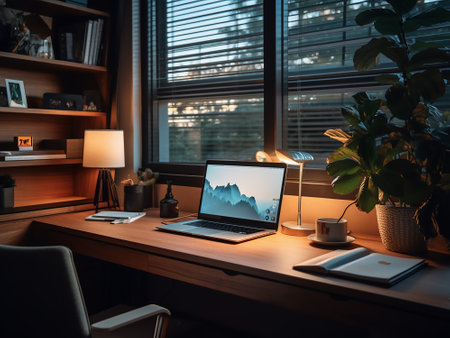Understanding Feng Shui: Foundations for American Workspaces
Feng Shui, an ancient Chinese practice, focuses on creating harmony between people and their environments. While it has deep roots in Eastern philosophy, its principles are surprisingly adaptable to modern American offices. By understanding the basics of Feng Shui, you can transform your workspace into a place that supports focus, creativity, and overall well-being.
What is Feng Shui?
At its core, Feng Shui is about balancing energy—known as “chi”—in a space. When energy flows smoothly, people tend to feel more comfortable, productive, and positive. In the context of American workspaces, this means arranging furniture and decor in ways that promote good vibes and reduce stress.
Why Desk Placement Matters
The placement of your desk is one of the most important aspects of office Feng Shui. The way your desk is positioned can influence your sense of control, focus, and even your success at work. In American offices—where open floor plans and shared spaces are common—finding the right spot for your desk can make a big difference.
Key Feng Shui Concepts Adapted for Modern Offices
| Feng Shui Concept | How It Applies in U.S. Offices |
|---|---|
| Command Position | Sit so you can see the door without being directly in line with it; this promotes a sense of security and awareness. |
| Clutter-Free Space | Keep your desk tidy to help clear your mind and reduce distractions. |
| Natural Light & Air | Position your desk near windows if possible; fresh air and daylight boost mood and energy levels. |
| Personalization | Add personal touches like photos or plants to make your workspace inviting but not overwhelming. |
| Balance & Symmetry | Avoid uneven piles or lopsided setups; balanced arrangements encourage calmness and productivity. |
Adapting Feng Shui for American Culture
Many Americans appreciate practicality and comfort in the workplace. When applying Feng Shui principles, its important to blend these concepts with local norms. For example, while traditional Feng Shui might recommend certain colors or materials, you can choose options that match your companys branding or fit within office policies. The goal is to create a space where you feel both empowered and at ease during your workday.
2. Choosing the Ideal Desk Location
Where you place your desk in your office can make a surprising difference in how productive, creative, and successful you feel at work. In modern American offices, it’s not just about where you fit your desk—it’s about setting yourself up for focus and good energy. Here’s what to keep in mind when choosing that perfect spot.
The Importance of Desk Placement
Feng Shui teaches us that the way we position our desks affects our mood, concentration, and even career growth. In a typical American office, distractions are everywhere—from chatty coworkers to buzzing phones—so finding the right location is key to staying on track and feeling positive throughout the day.
Desk Placement and Its Impact
| Desk Location | Focus Level | Creativity Boost | Career Impact |
|---|---|---|---|
| Facing a Wall | Low (can feel boxed in) | Limited (less inspiration) | Can feel stagnant |
| Back to Door | Easily distracted | Might miss opportunities | Lack of control |
| Facing Door (Command Position) | High (see who enters) | Energized & open-minded | Feel empowered, in charge |
| Near Window (Side View) | Balanced (natural light helps) | Boosted by outside views | Feels connected, inspired |
The Command Position: A Feng Shui Favorite
If possible, place your desk so you can see the door without being directly in line with it. This is known as the “command position” in Feng Shui. It gives you a sense of security and control, making you less likely to be startled or distracted by people entering unexpectedly. For most Americans, this also means you look approachable yet focused—a win-win at work!
Tips for Modern American Offices:
- Avoid sitting with your back to the door: You’ll feel more relaxed and confident if you can see what’s happening around you.
- If space is tight: Use mirrors or reflective surfaces so you’re aware of movement behind you.
- Sit near natural light if possible: Daylight keeps you alert and energized, but avoid glare on your screen.
- Add plants or artwork: These bring positive vibes and spark creativity without cluttering your workspace.
- Keep pathways clear: An open route to your desk signals that new opportunities can flow your way.
Your Desk Placement Checklist:
- Can you see the main entrance?
- Is there enough natural light nearby?
- Are your back and sides protected from distractions?
- Is your workspace free from clutter and obstacles?
- Do you feel comfortable and empowered where you sit?
The right desk location brings better focus, creativity, and career momentum—just what every modern American office worker needs!

3. Desk Orientation: Facing Opportunity and Success
Did you know that the direction your desk faces can shape your workday energy and even influence your career growth? In modern American offices, where space and layout vary greatly, understanding desk orientation using Feng Shui principles can give you an edge—without any complicated rituals or major renovations.
Why Desk Orientation Matters
According to Feng Shui, the way your desk is positioned affects how you receive energy (or “chi”). The right orientation helps you feel more in control, focused, and open to new opportunities. In a typical American office, this isn’t just about tradition; it’s about creating an environment where you can thrive.
Best Desk Directions for American Offices
| Desk Facing Direction | What It Symbolizes | Ideal For | American Office Tip |
|---|---|---|---|
| Toward the Door (but not directly in line) | Opportunity & Security | Most roles—especially leadership or client-facing positions | If possible, angle your chair so you see the door without being directly in its path |
| Toward a Window | Inspiration & Energy Boost | Creative roles, designers, writers | Add blinds or plants to minimize distractions but keep natural light |
| With Back to a Wall | Support & Confidence | Anyone needing extra focus or privacy | Avoid sitting with your back to open space or high-traffic areas if possible |
| Facing a Wall (with space in front) | Concentration & Privacy | Analytical roles, researchers, accountants | Add artwork or motivation boards to keep the space lively and inspiring |
| Directly Facing Coworkers (open plan) | Collaboration & Communication | Teams working closely together | Create subtle separation with small plants or organizers for personal boundaries |
Practical Tips for Any Workspace Layout
- Cubicles: Angle your chair to see the entrance of your cubicle. Place a small mirror on your monitor if your back is to the opening.
- Open Offices: Use headphones or desktop screens as “invisible walls” for focus. Sit with your back near a solid partition if possible.
- Private Offices: Set your desk so you face the door but aren’t aligned directly with it. Keep clutter minimal on both sides of the desk.
- Home Offices: Position your desk with a view of the room entrance. If facing a wall, hang motivational quotes or calming art in your line of sight.
The Power Position Explained
The classic Feng Shui “power position” means placing your desk so you have a clear view of who enters the room but aren’t directly in line with the doorway. This spot makes you feel secure and aware—think of it as having your back covered while keeping an eye on opportunities ahead.
No Perfect Layout? Do This Instead!
If moving your desk isn’t an option, don’t worry! Small adjustments like adding plants for balance, mirrors for visibility, or personal items for comfort can help boost positive energy no matter where you sit.
4. Personalizing Your Workspace: Decor and Organization Tips
Creating a workspace that’s both productive and welcoming is essential in the modern American office. By blending Feng Shui principles with local culture, you can select accessories, plants, and artwork that boost your energy and professionalism. Here’s how to get started:
Desk Accessories: Balance Function and Flow
Choose desk items that keep your space organized but don’t create clutter. According to Feng Shui, every object should have a purpose and a positive vibe. In American offices, it’s important to maintain a clean, professional look while expressing some personality.
| Accessory | Feng Shui Tip | American Office Style |
|---|---|---|
| Pen Holder | Select one in wood or ceramic for grounding energy. | Opt for simple designs in neutral colors. |
| Desk Lamp | Use soft, warm lighting to enhance focus and comfort. | Avoid overly bright or distracting lights; choose sleek styles. |
| Photo Frame | Add a single photo of loved ones for supportive energy. | Keep it small and tasteful—avoid personal photos that are too casual. |
Plants: Bring Nature Indoors
Plants represent life energy (chi) in Feng Shui. They purify the air and create a calming environment. However, American office culture values low-maintenance greenery that won’t take up too much space or require special care.
| Plant Type | Feng Shui Benefit | Office-Friendly Option |
|---|---|---|
| Lucky Bamboo | Encourages growth and flexibility. | Small arrangement in a glass vase fits most desks. |
| Pothos (Devil’s Ivy) | Cleanses air, easy to care for. | Tolerates low light; hang or place on shelf nearby. |
| Snake Plant | Protects against negative energy. | Slim shape fits well in corners or beside monitors. |
Artwork: Inspire and Motivate
The right artwork can uplift your mood and reinforce professional goals. In Feng Shui, images of nature, water, or abstract forms are ideal as they invite harmony and creativity. In the U.S., it’s common to keep art neutral and non-controversial in shared spaces.
Tips for Selecting Artwork:
- Avoid images with negative themes or chaotic patterns.
- Choose calming landscapes or inspirational quotes framed neatly.
- If allowed, add subtle pops of color that reflect your personality without overwhelming your space.
Organization: Keep Energy Flowing Smoothly
An organized desk helps chi flow freely, supporting productivity. Use trays or organizers to group similar items together. Limit personal items to 2-3 pieces to maintain a professional appearance while still making the space feel like yours.
Quick Checklist for Desk Organization:
- Clear off unnecessary papers at the end of each day.
- Cord organizers keep cables tidy and out of sight.
- Use drawers for supplies you don’t need frequently.
- Add a small bowl for keys or coins if you drive to work—this contains scattered energy.
Personalizing your workspace with Feng Shui in mind doesn’t mean sacrificing professionalism. With thoughtful choices, you can create an office environment that feels energizing and uniquely yours while respecting American workplace norms.
5. Common Pitfalls and How to Avoid Them
Desk Placement Mistakes Often Seen in American Offices
Setting up your workspace for success is about more than just style and comfort; it’s also about energy flow and productivity. Even with the best intentions, many American offices make simple mistakes that can block positive energy, cause stress, or limit personal growth. Let’s highlight some of these common pitfalls and show you easy ways to fix them using Feng Shui principles adapted for modern work environments.
Pitfall 1: Facing a Wall Directly
Why it’s a problem: Sitting with your face right up against a wall can feel limiting and uninspiring. It can make you feel boxed in and stifle creativity.
How to Fix It:
- Move your desk so you can see into the room.
- If moving isn’t possible, add artwork, a mirror, or plants to bring life to the wall in front of you.
Pitfall 2: Back to the Door
Why it’s a problem: Having your back to the entrance can create anxiety because you can’t see who’s coming. This position is called the “command position” in Feng Shui and is believed to influence confidence and control.
How to Fix It:
- Whenever possible, place your desk so you can see the door while working.
- If you must sit with your back to the door, use a reflective object like a small mirror or computer screen to keep an eye on what’s behind you.
Pitfall 3: Desk Clutter
Why it’s a problem: A cluttered desk leads to a cluttered mind. It blocks energy flow and makes it harder to focus or feel motivated.
How to Fix It:
- Clear off unnecessary items daily.
- Organize essentials into drawers or storage containers.
- Add one inspiring item like a plant or photo for positive vibes.
Pitfall 4: Ignoring Natural Light
Why it’s a problem: Working under harsh artificial lights with no exposure to natural light can drain your energy and negatively impact mood and productivity.
How to Fix It:
- If possible, position your desk near a window for sunlight and fresh air.
- If windows aren’t available, consider daylight-simulating lamps and take regular breaks outdoors.
Pitfall 5: Desk Location Near High-Traffic Areas
Why it’s a problem: Being close to busy hallways or printer stations means constant distractions, noise, and interruptions—all of which break concentration.
How to Fix It:
- Add privacy screens or plants as barriers if you can’t move your desk.
- Use noise-canceling headphones during focused work periods.
Quick Reference Table: Common Pitfalls & Solutions
| Pitfall | Impact | Feng Shui Solution |
|---|---|---|
| Sitting Facing a Wall | Lack of inspiration, feeling stuck | Add art/plants or rearrange desk orientation |
| Back Towards Door | Anxiety, lack of control | Sit facing door; use mirrors if not possible |
| Desk Clutter | Mental stress, blocked energy | Tidy up daily; organize essentials; add uplifting decor |
| No Natural Light | Lethargy, low mood | Sit near window; use daylight lamps; take outdoor breaks |
| Near High-Traffic Areas | Noisy distractions, low focus | Add screens/plants; use headphones |
Avoiding these common mistakes helps create an office environment that supports well-being and encourages personal growth—making your workspace truly work for you!


